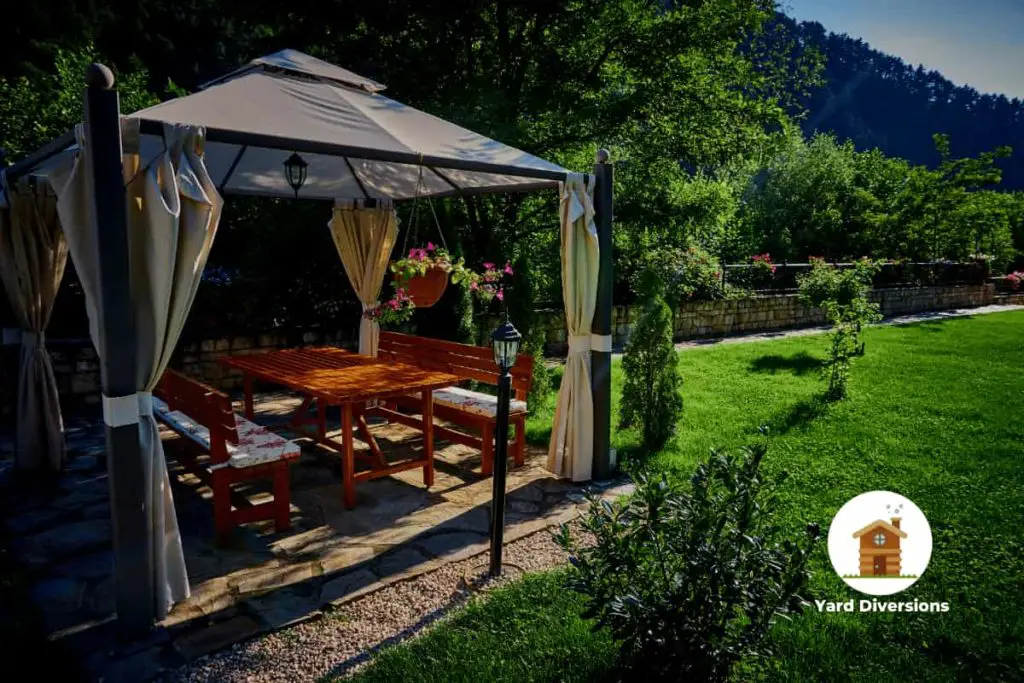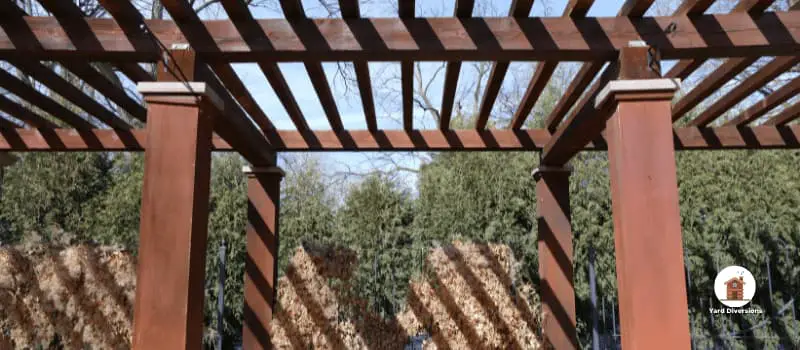Pergolas tend to be fairly easy to install. If you get a kit, you should be able to build it yourself in a weekend. But before you start building you should think about any legal issues you might face.
So, what approvals or permits will you need to build a pergola?
Typically a small, freestanding pergola can be built without any permits. But when it is attached to an existing structure, like a house, you might require a permit. Additionally, if you are in a homeowner’s association will also have some regulations that owners will need to follow.
Like any other construction project, there are a few rules and regulations that you will need to keep in mind. This ensures that everything will meet the required safety standards.
Thankfully, the paperwork involved in a pergola tends to be fairly minimal. Keep reading to make sure that your pergola will meet building codes.

Do You Need Approval For A Pergola?
It’s common to require a few approvals before building a pergola. Sometimes, there might be legal requirements from the local council. Depending on the circumstances, you might need to apply for a permit. It’s also common for homeowners’ associations to set out regulations for new construction.
Usually, though, pergolas will be smaller structures, and as long as you are building a freestanding structure away from other buildings, you might not need to get a permit from the council.
But this won’t always be the case, sometimes you may still need a few permissions before you can start construction on a pergola, even if you own the land on which the pergola will be built.
It’s always a good idea to check the regulations you must follow. These rules come in two forms, approvals from the local council and approvals from homeowners’ associations.
Let’s look at both approaches to learn what will be involved.
Council Approvals
Talking to the local council before starting any construction project is always best.
They will be able to give you clear guidelines on what you can and can’t do. They will also tell you what permits you will need to obtain.
To be approved, you must provide some paperwork to the local council. This might include:
- Proposed plans for the pergola. This will need to show where the pergola will be positioned and the dimensions of the proposed pergola. Depending on how strict your county is, you might need an engineer to approve these documents.
- Post-construction inspection. This is only needed for larger pergolas, which will be attached to the house. The council needs to ensure that the house can support the weight of the pergola.
- How it will impact any structures. This will affect the pergolas that will be attached to the house. They want to ensure that it won’t negatively impact the structural integrity of the existing building.
- An inspection. Sometimes, the council will want to inspect the finished pergola before giving it the final tick of approval. This is usually only required for larger structures.
It should be noted that it can take a few weeks before you will receive your permit. So, it’s important to be patient.
Sometimes, you won’t have any problems building the structure. But you will need a permit to add features, like pouring a concrete floor. It’s always best to contact the council and double-check.
If you are using a construction company, they will be able to handle the approval process on your behalf.
For a more complex build, like attaching a pergola to an existing building, it can be worth spending a little more money so you can avoid the paperwork.
It should be noted that some areas might be tougher to build in. An example of this is a site that has been designated “of historical importance”.
Any structure you build on these sites will need to go through a strict approval process.

Homeowners Association
If you have a homeowner’s association, they will usually have some rules that determine the type of structures you can build and where they can be located.
Some of the things they might be concerned with include:
- Whether the pergola will block a neighbor’s view
- How tall it will be
- How far it will be from the edge of the property
It’s often best to contact them and show them the plans. Then, you can discuss any modifications so the structure can be approved.
What Rules Do Pergolas Need To Meet?
Pergolas will need to comply with fire safety, zoning laws, and rules put in place by the housing association. Owners will need to make sure that they are hiring tradespeople with appropriate qualifications, so their work will fulfill legal requirements.
The council has a strict approval process to make sure that all buildings will be safe. There are a few things that they will be looking at, this can include:
- Fire safety. You will usually need to stay a minimum distance from your fence and your house.
- Zoning laws. This might impact the number of structures that can be placed on the property or where they can be positioned.
- Work must be done by qualified tradespeople. If you are planning on installing electrical elements, like a heater or sound system, there will be a series of laws you need to follow. Because of this, it’s best to get a professional to do this work for you.
Usually, pergolas will be nine to 12 feet high. As long as you stick to these rules, you shouldn’t have any problems.
However, if you are planning something that will be over 12 feet high, you might need to seek approval from the council.
Can I Hang a Hammock on My Pergola?
Hanging a hammock on a pergola can create a relaxing haven in your backyard space. However, the pergola might not be strong enough to support the weight safely. To ensure stability, consider attaching the hammock to a sturdy backyard fence post for hammock installation. This will offer a secure spot to enjoy leisurely swinging and unwinding in your tranquil outdoor retreat.
What Happens If You Build Without A Permit?
Most commonly, offenders will be facing a stiff fine. It could be up to $500 a day until they have obtained a valid permit. In more severe cases, an inspector may declare that the structure will need to be demolished. This can end up costing thousands.
The type of penalties you could be facing will vary. If you needed a permit and started construction without one, you will often be looking at a fine.
Sometimes, you could be looking at $500 a day. This will need to be paid until you have a valid permit.
It’s common for a council inspector to come to the house and look at the pergola. If they find mistakes that could compromise your safety, they will ask you to demolish it and start again. This is the worst possible outcome, as it can cost you thousands of dollars.
If the work hasn’t been approved it can also create problems if you have any property damage. Your homeowner’s insurance might refuse to reimburse you, forcing you to pay out of pocket.
It can also create problems if you try to sell your house. Sometimes, you will need to pay for the permits retrospectively. This can take away from the profits you made through the sale.
Do I Need a Permit to Build an Outdoor Fire Pit as Part of My Pergola Construction Project?
Yes, you may need a permit to build an outdoor fire pit as part of your pergola construction project. The cost of outdoor fire pit permits varies depending on your location and the specific regulations in your area. It’s important to check with your local building department to ensure compliance.
Final Thoughts
It’s always a good idea to check the types of permits and approvals you need before you start building a pergola, we offer a more detailed buyers guide if you are looking to start from scratch.
If you don’t, there is a chance that you could be left facing a harsh financial penalty.

